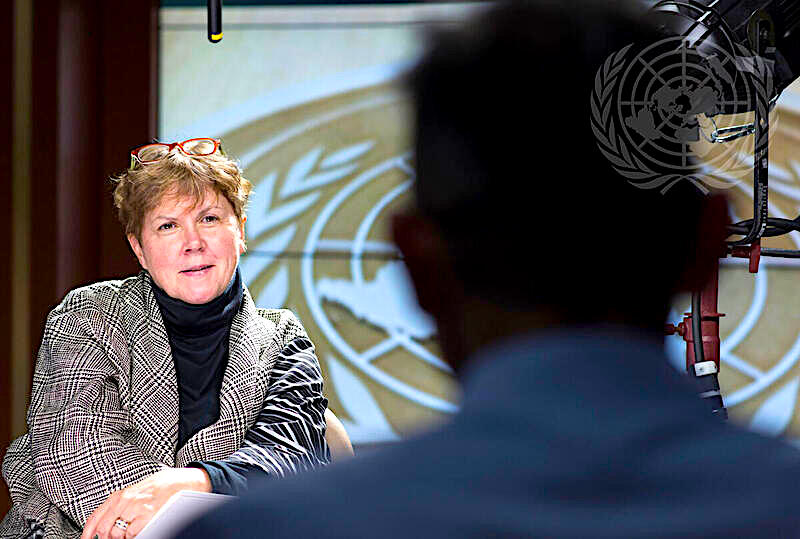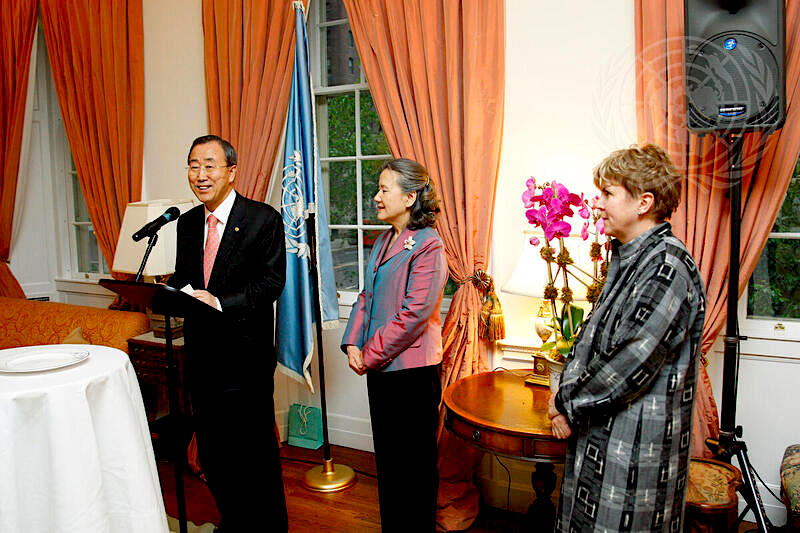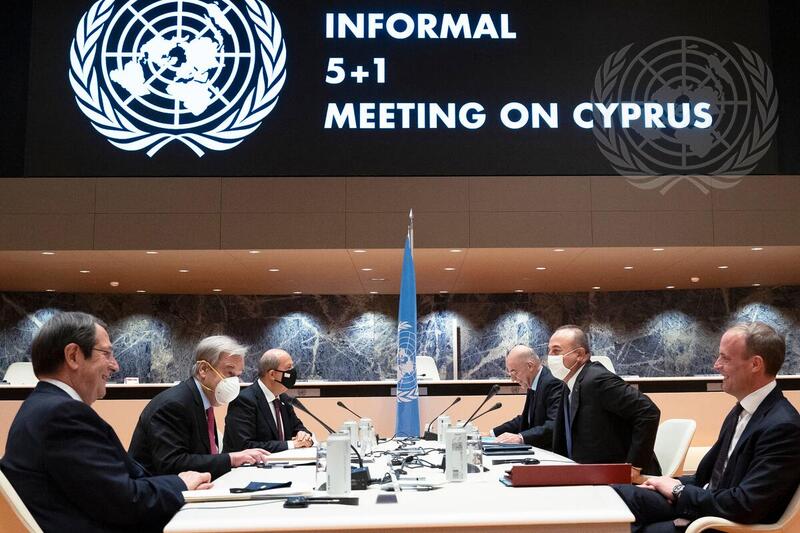If Jane Holl Lute’s many endeavors outside the U.N. passed the institution’s ethics test, her latest gig became more complicated, Stéphanie Fillion reports.

Jane Holl Lute, special coordinator on improving the U.N. response to sexual exploitation and abuse, being interviewed by U.N. news outlets in 2016. (U.N. Photo/Mark Garten)
By Stéphanie Fillion
PassBlue
Jane Holl Lute is in high demand. In 2020, on top of her two high-level United Nations jobs, the American diplomat has juggled other numerous executive roles on corporate and/or nonprofit boards, earning more than $900,000, according to public records. Lute was the U.N. envoy for Cyprus until she resigned in August, and she still holds the post of special coordinator on improving the U.N.’s response to sexual exploitation and abuse.
If her many endeavors outside the U.N. passed the U.N.’s ethics test, her latest gig became more complicated: working as a nonexecutive director for Royal Dutch Shell, the multinational energy company based in the Netherlands. The company has stakes in the heart of the longstanding Cyprus conflict: natural resource exploitation in the Mediterranean Sea.
Lute’s directorship was announced in March by Shell, and it did not mention her U.N. jobs. She resigned the Cyprus post five months after the Shell announcement, upon recommendation by the U.N. ethics committee, according to the U.N. spokesman, Stéphane Dujarric.
Lute, however, has retained the U.N.’s special coordinator post on sexual abuse and exploitation (“SEA”) with rank of under secretary-general. She is paid by the U.N. only for the time she works for the organization, on a prorated salary basis. She was appointed to that post full time in February 2016, but in May 2017, she went to a part-time basis. As for the Cyprus post, she was appointed to it in May 2018 and held it until August 2021, on a pro-rated basis.
“The combination of U.N. under secretary-general and non-executive director of Shell is like oil and water; the two positions are incompatible,” Paula Donovan told PassBlue in a video interview. She is co-executive director of AIDS-Free World, an advocacy organization that has sent open letters to U.N. Secretary-General António Guterres, raising the issue of Lute’s roles at the U.N. while working for private companies and her overall engagement in the SEA job.
If the U.N. seems to have accepted Lute’s juggling two part-time roles, her other endeavors beg the question as to whether civil servants should mix any role with corporations and outside boards. “I wouldn’t really comment on that. Different people who . . . work on a when-actually-employed basis have other employment,” Farhan Haq, the deputy spokesperson for Guterres, said on Dec. 21. “We expect them, certainly, to uphold ethical guidelines while they’re doing their job.”
Just weeks after the U.N.-led COP26 meeting on climate change was held in Glasgow, Scotland, in November, where Guterres pushed for the total elimination of fossil-fuel use globally, Donovan noted the contradictory optics of Lute having worked for the U.N. while also for Shell.
“It’s just beyond belief,” Donovan said. “No senior U.N. official should ever simultaneously have a non-executive director role or any other top management position in one of the world’s largest oil companies.”
An American in High Places

May 14, 2009: Secretary-General Ban Ki-moon, left, addresses a reception for Jane Holl Lute, right, former assistant secretary-general for peacebuilding support, at his residence in New York. (U.N. Photo/Mark Garten)
Lute has been holding many prestigious roles for years. Besides her two U.N. roles, in 2020, she was on the board of five companies or nonprofit organizations, including Marsh McLennan, starting in March 2020; Union Pacific, the Center for Internet Security, the Atlantic Council and Atlas Air Worldwide Holdings. In 2020, she was also chief executive and eventually director of SICPA North America and an affiliate, Meyercord. The latter calls itself a “leading U.S. provider of excise tax collection solutions that help government and law enforcement agencies reclaim lost revenue, close state budget gaps and protect jobs and essential public services.”
Companies Lute is affiliated with operate in a variety of industries, including cybersecurity, railroads, aviation and international relations. SICPA, a Swiss company with an American base in Springfield, Virginia, is involved in oil and gas “integrity management,” which means that it supports governments and companies in the “fight against illicit trade of hydrocarbon products,” the company says.
| Entity | Compensation (2020) |
| Marsh McLennan | $261,333 |
| Atlas Air Worldwide Holdings | $217,009 |
| Union Pacific | $321,944 |
| Center Internet Security | $104,000 |
| Atlantic Council | $0 |
| SICPA North America | Undisclosed |
Lute is one half of a power couple in Washington, D.C., being married to Douglas Lute, a retired U.S. Army lieutenant general and former senior White House adviser. (Jane Holl Lute is a former U.S. Army career officer as well.) They are both directors on the board of the Atlantic Council, a think tank.
In response to numerous requests for comments, including verification of her earnings in 2020 and 2021, Lute said in a written statement to PassBlue, provided by Dujarric:
“My activities in the private sector are public knowledge, including my positions on various boards. All of this has been fully disclosed according to the established procedures of the United Nations, an organization I only serve on a ‘when actually employed’ basis.”
This arrangement enables Lute to have other jobs outside the U.N.. The organization has a policy of encouraging voluntary public financial disclosure of high-level officials. If Lute has provided such disclosures to the U.N., they have not been made public.
PassBlue assessed that her compensation for the board positions she held in 2020 exceeded $900,000, excluding her compensation at SICPA, Meyercord and the U.N.. The U.N. would not disclose Lute’s compensation for the organization. Her salary at Shell has not been disclosed either.
According to an email sent by Dujarric, “Using ‘when actually employed’ or ‘$1 a year’ contracts gives the United Nations access to experts with specific skills for specific situations,” he wrote. “Whether working full time or when actually employed, all are expected to ensure that they have no conflict of interest and uphold the highest standards of ethics.”
Farewell, Cyprus

Secretary-General António Guterres, second from left, attends the informal 5+1 meeting on Cyprus in Geneva on April 28. (U.N. Photo/Jean Marc Ferré)
Between the two main parties involved in the decades-long Cyprus conflict, the Greek Cypriots and the Turkish Cypriots, there is one consensus: Lute acted professionally. She previously worked at the U.N. as an assistant secretary-general for peacekeeping between 2003-2007 and was deputy secretary for the U.S. Department of Homeland Security under the Obama administration.
“Jane Holl Lute is from Georgetown, I’m from George Washington,” said Ergun Olgun, special representative of the president of the Turkish Republic of Northern Cyprus, or TRNC, and the main negotiator for the Turkish Cypriot side, referring to universities in Washington. “I mean, we talk the same language, so we could communicate easily.”
Andreas Mavroyiannis, the main negotiator for the Greek Cypriots in U.N.-led negotiations to broker a peaceful solution to the island’s political divisions, said: “We certainly are grateful to Jane for her honesty, integrity, and sense of duty. She spent three years working on putting the negotiating process back on track. I don’t believe that the lack of breakthrough has anything to do with her degree of involvement.”
Lute was appointed to the board of Royal Dutch Shell in March 2021, effective May 18, shortly after the main parties involved in the Cyprus conflict met in Geneva to potentially find common ground to resume negotiations again, after many attempts over many years. That includes concerted efforts by Guterres when he first became secretary-general in 2017. Natural resource exploitation now lies at the heart of tensions between the two parties in Cyprus.
After being appointed to Shell’s board, Lute kept her envoy role for a few months and even traveled to the island. When asked about how the U.N. ensured that Lute did not share any of the privileged information she had access to on the status of the Eastern Mediterranean Sea with Shell, Haq of the U.N. said:
“All U.N. officials are to maintain a close hold on all of the privileged information they receive in their jobs as U.N. officials. They are not, under our rulings and our ethical guidelines, allowed to share that with other employers after they leave U.N. employment, and that is expected of Jane Holl Lute just as it is for everyone else. And we have no reason to expect that she would abuse the normal guidelines at the United Nations.”
Support CN’s Winter Fund Drive!
Lute seemed to plan to keep her envoy role while working for Shell, at least for a while, according to Mavroyiannis.
“She even inquired whether we perceived incompatibility,” Mavroyiannis told PassBlue. “As I understand, nobody raised serious objections. When the ethics office of the U.N. came up with the conclusion that there might be a potential conflict of interest at the end of August, she kept us informed, so her eventual resignation did not come as a surprise.”
According to U.N. spokesperson Dujarric, the organization “does not make decisions on outside activities, but rather, it makes recommendations and provides advice.” He said that Lute brought up her new situation in the spring and it was recommended by the U.N.’s ethics committee that she leave her Cyprus post.
“The information we had was that Shell was not interested in the resources of Eastern Mediterranean at the time,” Olgun, the Turkish Cypriot negotiator, said. However, Royal Dutch Shell, along with other energy giants, has exploration rights and exploitation licenses in Cyprus’s exclusive economic zone as well as in the Turkish Cypriot region (though part of the latter’s claim is not internationally recognized), in the Eastern Mediterranean Sea.
The parties in the Cyprus file admit that not much progress was made during Lute’s term, but they do not blame her for the lack of success. “I don’t believe that the lack of breakthrough has anything to do with the degree of her involvement,” Mavroyiannis said. Lute traveled several times to Cyprus in 2021, as well as to Geneva, where the relevant parties met in April.
Sexual Exploitation

April 9, 2016: Jane Holl Lute, center, special coordinator on improving the U.N. response to sexual exploitation and abuse visiting Bambari, Central African Republic. (U.N. Photo/Nektarios Markogiannis)
If the U.N. judged Lute’s new gig with Shell a potential conflict of interest, it passed the threshold of her U.N. role countering sexual exploitation and abuse in the U.N. system (including in peacekeeping). She was appointed to the post in 2016 by then-Secretary-General Ban Ki-moon.
In Guterres’s remarks at his oath-of-office ceremony in December 2016, only weeks before he became secretary-general for the first time (he is heading into a second term in January), he said he would make eradicating sexual exploitation in the U.N. a priority.
Yet the problem persists, as it has for decades, as awareness-raising and other steps are being done to try to root out the causes. Most recently, the entire military battalion of Gabonese peacekeepers was expelled from the U.N. mission in the Central African Republic, a bold move for the U.N..
Since she became the special coordinator, Lute has traveled for this role only to the Central African Republic (in 2016), and even her own staff noted her lack of engagement in the file in a March 2021 Office of Internal Oversight Services report. It assessed the “relevance and effectiveness of the prevention, response and victim support efforts against sexual exploitation and abuse (SEA) by U.N. Secretariat staff and related personnel covering the 2015-2018 period.”
But information from earlier periods and current data, when available and relevant, were included in the evaluation results, the report noted.
“Stakeholders described the OSC [Office of the Special Coordinator] as an effective mechanism that improved coherence, coordination, knowledge sharing, and dissemination across the System with 46 per cent of 87 interviewees rating its effectiveness positively (24%) and somewhat positively (22%),” the report said, adding that a quarter of interviewees identified the need for more visibility of the office.
“Although the OSC was a coordination role, and not necessarily the ‘face’ of the issue, interviewees expressed expectations of greater visibility and approachability of the Special Coordinator, as well as of her actual presence at SEA workgroup meetings where she was officially the chair. The double-hatting of the Special Coordinator was perceived by some to have contributed to lower visibility of the Office and further diminishing of its resources.” (“Double-hatting” refers to Lute’s two U.N. jobs.)
Supported by extrabudgetary funding of approximately $3.3 million from seven countries from 2016 to 2019, the appointment of the special coordinator was initially for 11 months but has been extended annually since then, albeit on a “when-actually-employed” contract since May 2017.
Representatives of three of the seven countries that help fund the office “raised concerns about the quality of work of the Office, its cost compared to outcome, and lack of understanding of its activities in general,” the report said.
It concluded that though “we have seen good progress in entrenching a vibrant system-wide approach to prevention and response to sexual exploitation and abuse across the United Nations in the four years since the introduction of the Secretary-General’s new strategy . . . “we are not complacent and recognize that constant vigilance and engagement of senior leadership, mainstreaming of awareness-raising, training and accountability mechanisms are required.”
This article is from PassBlue.
Support CN’s
Winter Fund Drive!
Donate securely with PayPal
Or securely by credit card or check by clicking the red button:


Shell is dropping the ‘Royal Dutch’ and moving its corporate HQ to London, in order to avoid those pesky EU environmental rules and fines.
Well it’s kind of why a lot of people don’t trust the “new world order” qualities of the U.N. This is like the film “The Whistleblower” based on the true story of Kathryn Bolkovac played by Rachel Weisz with Vanessa Redgrave exposing the sex trafficking in Bosnia by the UN contractors who wouldn’t be prosecuted because they had “immunity” strangely enough. It’s appalling that anybody working for Shell in that capacity is considered ethically qualified for that kind of U.N. work. Maybe we should hold the U.N. more accountable considering how much money they get from member countries.
hXXps://www.youtube.com/watch?v=E56OYUV7BWw
It used to be many feathers on the same hat, now it has progressed to many hats on the same head. Being a woman rotating various hats are just harmless fashion statements, I guess. Meanwhile, rising unemployement remains a permanent global curse that even the UN couldnt tackle !
Unconscionable!!! But then…the Yanx.
This person sure seems to have gamed the system.
Reminds me of a latter-day Sir Joseph Porter from Gilbert & Sullivan’s HMS Pinafore:
“I always voted at my party’s call,
And I never thought of thinking for myself at all….
I thought so little, they rewarded me
By making me the Ruler of the O.S.C.!”